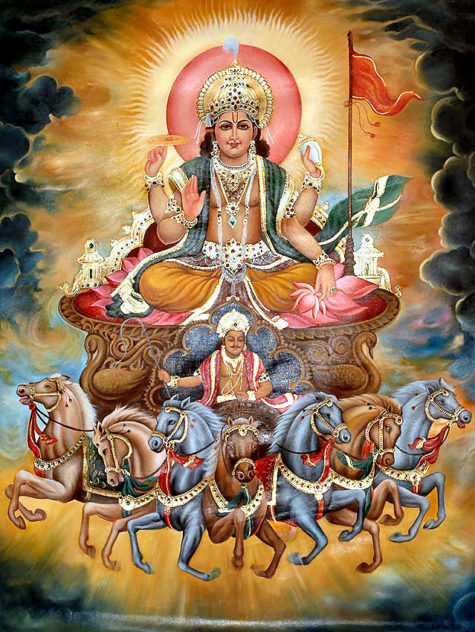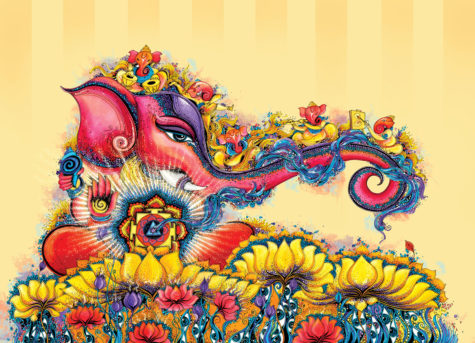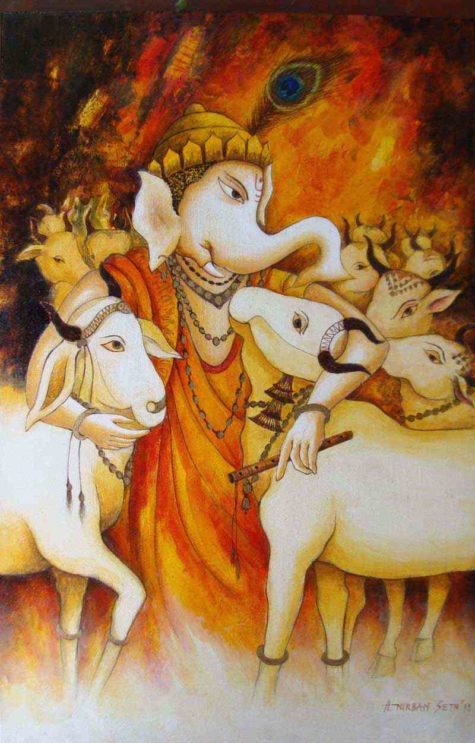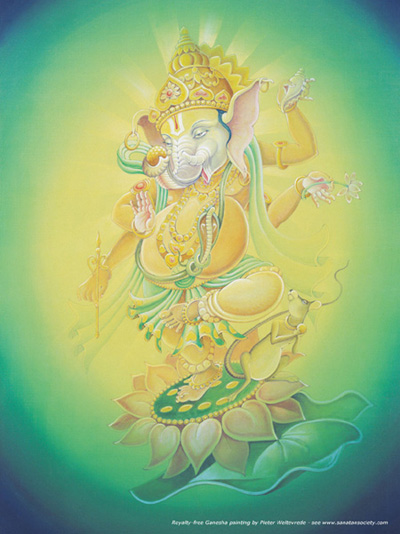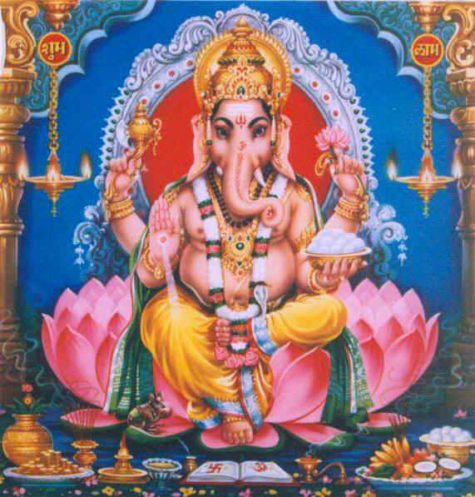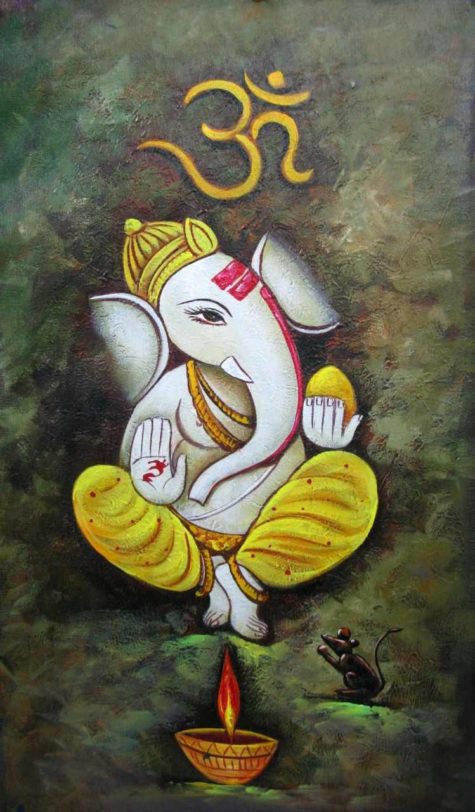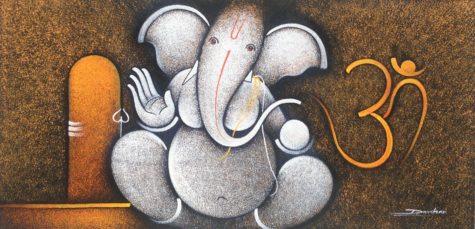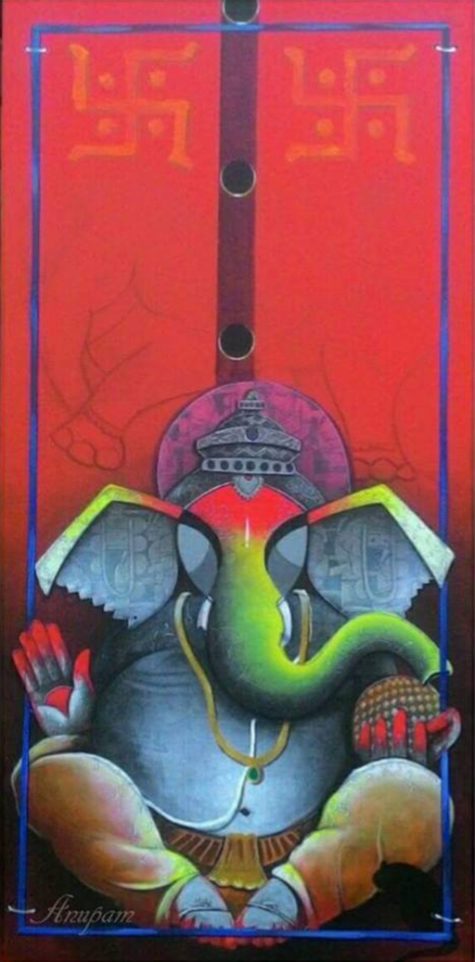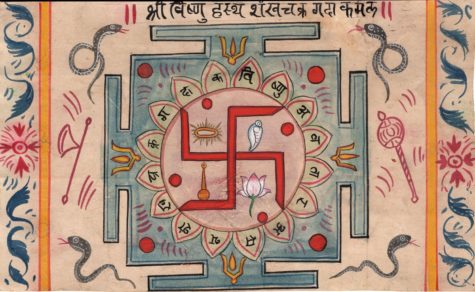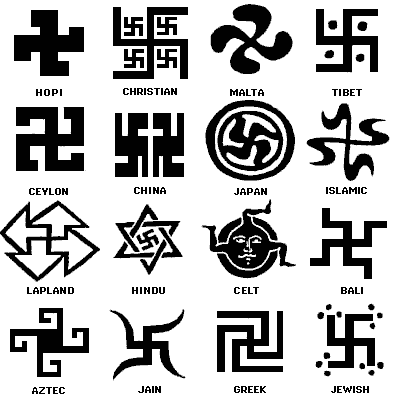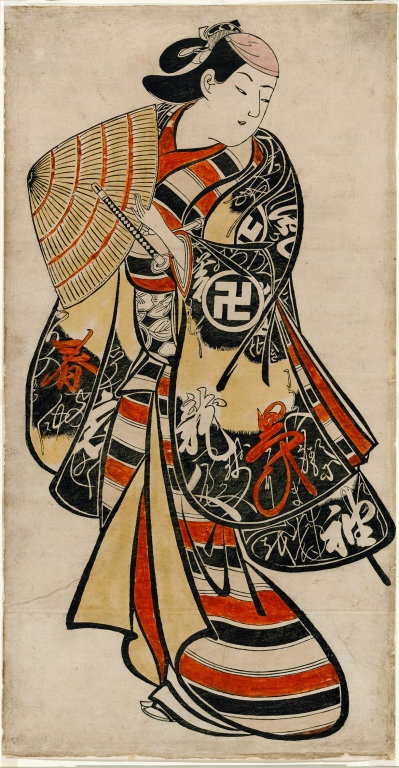Hinduism
The 108 Names of Surya
The oldest surviving Vedic hymns mention Sūrya with particular reverence for the “rising sun” and its symbolism as dispeller of darkness, one who empowers knowledge, the good and all life.
The Mahabharata epic opens its chapter on Surya that reverentially refers to him as the “eye of the universe,” soul of all existence, origin of all life, goal of the Samkhyas and Yogis, and symbol of freedom and spiritual emancipation.
Interestingly, Surya’s synonym Ravi is the root of the word ‘Ravivara‘ or Sunday in the Hindu calendar. In both Indian and Greek-Roman nomenclature for days of the week, the Sunday is dedicated to the Sun.
From The Mahabharata:
The Sun, which is the representation of the Supreme Lord Sri Krishna, is known by 108 names.
These are the hundred and eight names of Surya of immeasurable energy, as told by the Brahma. These names were disclosed of old by Lord Brahma, the self created, to the illustrious Sakra, and from Sakra to Narada, and from Narada to Dhaumya, and from Dhaumya to the sons of Pritha, the Pandavas.
For the acquisition of prosperity, I bow down to thee, O Bhaskara, blazing like unto gold or fire, who is worshipped of the gods and the Pitris and the Yakshas, and who is adored by Asuras, Nisacharas, and Sidhas.
Dhaumya said to Yudhistira:
Aruna, Sharanya, Karuna-rasa-sindhu, Asmanabala, Arta-rakshaka, Aditya, Adibhuta, Akhila-gamavedin, Achyuta, Akhilagya, Ananta, Ina, Vishvarupa, Ijya, Indra, Bhanu, Indriramandirapta, Vandaniya, Isha, Suprasanna, Sushila, Suvarchas, Vasuprada, Vasu, Vasudeva, Ujjaval, Ugrarupa, Urdhvaga, Vivasvat, Udhatkiranajala, Hrishikesha, Urjasvala, Vira, Nirjara, Jaya, Urudvaya-bhavaroopayukta-sarathi, Rishivandya, Rugghantr, Rikshachakrachara, Rijusva-bhavachitta, Nityastutya, Rikaramatrikavarnarupa, Ujjvalatejas, Rikshadhinathamitra, Pushkaraksha, Luptadanta, Shanta, Kantida, Ghana, Kanatkanaka-bhusha, Khadyota, Lunitakhila-daitya, Satyananda-svarupin, Apavarga-prada, Arta-sharanya, Ekakin, Bhagavat, Srishti-sthityantakarin, Gunatman, Ghrinibhrit, Brihat, Brahman, Eshvaryada, Sharva, Haridashva, Shauri, Dashadiksam-prakasha, Bhakta-vashya, Ojaskara, Jayin, Jagadanandahetu, Janma-mrityu-jara-vyadhi-varjita, Uchchasthana samarudha-rathastha, Asurari, Kamaniyakara, Abjavallabha, Antarbahih prakasha, Achintya, Atmarupin, Achyuta, Amaresha, Para Jyotish, Ahaskara, Ravi, Hari, Paramatman, Taruna, Varenya, Grahanam Pati, Bhaskara, Adimadhyantarahita, Saukhyaprada, Sakalajagatam Pati, Surya, Kavi, Narayana, Paresha, Tejorupa, Hiranyagarbha, Sampatkara, Aem Istarthada, Am Suprasanna, Shrimat, Shreyas, Saukhyadayin, Diptamurti, Nikhilagamavedya, Nityananda
Whoever with fixed attention recited this hymn at sunrise, obtaineth wife and offspring and riches and the memory of his former existence, and by reciting this hymn a person attaineth patience and memory. Let a man concentrating his mind, recite this hymn. By doing so, he shall be proofed against grief and forest-fire and ocean and every object of desire shall be his.
And a person, male or female, that recited this hymn every day in the two twilights (sunrise and sunset) his mind concentrated with ascetic abstraction, obtained every boon he desired, however difficult it may be that he ask for. If he is overtaken by danger, he is delivered from it; and if bound, he is freed from the bonds.
The Names as Mantras:
Here is a list of the 108 names in the form of a mantra along with the meaning. They can be used individually as a mantra practice, or you could recite them all as a long meditation. I especially love #30. When read aloud, in English, this makes an awesome invocation to the Sun!
- 1. Om Arunaya Namah
Adoration to the Reddish Brown one. - 2. Om Sharanyaya Namah
Adoration to The One Who Provides Refuge - 3. Om Karunarasasindhve Namah
Adoration to The Ocean of the Sentiment of Compassion - 4. Om Asamanabalaya Namah
Adoration to The One of Unequalled Strength. - 5. Om Artarakshakaya Namah
Adoration to The Protector from Suffering - 6. Om Adityaya Namah
Adoration to The Sun or The Son of Aditi - 7. Om Adibhutaya Namah
Adoration to The First Being - 8. Om Akhilagamavedine Namah
Adoration to The Knower of All Scriptures - 9. Om Achyutaya Namah
Adoration to Imperishable, The Steady One - 10. Om Akhilajnaya Namah
Adoration to The Knower of Everything - 11. Om Anantaya Namah
Adoration to The Unbounded One - 12. Om Inaya Namah
Adoration to The Strong One - 13. Om Vishvarupaya Namah
Adoration to The One with an All Pervading Form - 14. Om Ijyaya Namah
Adoration to The One to be Revered - 15. Om Indraya Namah
Adoration to Leader of the Gods - 16. Om Bhanave Namah
Adoration to The Bright One - 17. Om Indiramandiraptaya Namah
Adoration to The One Who has Gained the Abode of Indira (Lakshmi) - 18. Om Vandaniyaya Namah
Adoration to The Praiseworthy One - 19. Om Ishaya Namah
Adoration to The Lord - 20. Om Suprasannaya Namah
Adoration to The Very Bright One - 21. Om Sushilaya Namah
Adoration to The Good-Natured One - 22. Om Suvarchase Namah
Adoration to The Brilliant One - 23. Om Vasupradaya Namah
Adoration to The Bestower of wealth - 24. Om Vasave Namah
Adoration to The Deva (The Excellent One) - 25. Om Vasudevaya Namah
Adoration to Krishna - 26. Om Ujjvala Namah
Adoration to The Blazing One - 27. Om Ugrarupaya Namah
Adoration to The One with a Fierce Form - 28. Om Urdhvagaya Namah
Adoration to The One Who Rises Up - 29. Om Vivasvate Namah
Adoration to The One Who Shines Forth - 30. Om Udyatkiranajalaya Namah
Adoration to The One Who Produces a Lattice of Rising Beams of Light - 31. Om Hrishikeshaya Namah
Adoration to Lord of the Senses - 32. Om Urjasvalaya Namah
Adoration to The Mighty One - 33. Om Viraya Namah
Adoration to The Brave One - 34. Om Nirjaraya Namah
Adoration to The Imperishable One - 35. Om Jayaya Namah
Adoration to The Victorious One - 36. Om Urudvayabhavarupayuktasarathaye Namah
Adoration to The One Whose Charioteer has a Form without a Pair of Thighs - 37. Om Rishivandyaya Namah
Adoration to The One Worshipped by Rishis - 38. Om Rugghantre Namah
Adoration to The Destroyer of Disease - 39. Om Rikshachakracharaya Namah
Adoration to The One Who Moves Through the Wheel of Stars - 40. Om Rijusvabhavachittaya Namah
Adoration to The One Whose Mind by Nature is Sincere - 41. Om Nityastutyaya Namah
Adoration to The One Who is Fit to be Praised Always - 42. Om Rikaramatrikavarnarupaya Namah
Adoration to The One Who has the Form of the Letter Rikara - 43. Om Ujjvalatejase Namah
Adoration to The One with a Blazing Brilliance - 44. Om Rikshadhinathamitraya Namah
Adoration to The Friend of the Lord of Stars (the Moon) - 45. Om Pushkarakshaya Namah
Adoration to The Lotus-Eyed One - 46. Om Luptadantaya Namah
Adoration to The One Whose Teeth are Lost - 47. Om Shantaya Namah
Adoration to the one who is Pacified, Calm - 48. Om Kantidaya Namah
Adoration to The Bestower of Beauty - 49. Om Ghanaya Namah
Adoration to The Destroyer - 50. Om Kanatkanakabhushaya Namah
Adoration to The Brilliant Golden Ornament - 51. Om Khadyotaya Namah
Adoration to The Light of the Sky - 52. Om Lunitakhiladaityaya Namah
Adoration to The Destroyer of All Demons - 53. Om Satyanandasvarupine Namah
Adoration to The One Whose Nature is True Bliss - 54. Om Apavargapradaya Namah
Adoration to The Bestower of Liberation - 55. Om Artasharanyaya Namah
Adoration to The Provider of Shelter to the Distressed - 56. Om Ekakine Namah
Adoration to The solitary One - 57. Om Bhagawate Namah
Adoration to The Divine One - 58. Om Srishtisthityantakarine Namah
Adoration to The One Who Makes the Creation, Maintenance, and End - 59. Om Gunatmane Namah
Adoration to The One with Qualities - 60. Om Ghrinibhrite Namah
Adoration to The One Who Possesses Light - 61. Om Brihate Namah
Adoration to The Great One - 62. Om Brahmane Namah
Adoration to The Eternal Brahman - 63. Om Aishwaryadaya Namah
Adoration to The Bestower of Power - 64. Om Sharvaya Namah
Adoration to The One that Injures - 65. Om Haridashwaya Namah
Adoration to The One with Tawny Horses - 66. Om Shauraye Namah
Adoration to The Heroic One - 67. Om Dashadiksamprakashaya Namah
Adoration to The One Who Shines in Ten Directions - 68. Om Bhaktavashyaya Namah
Adoration to The One Who is Attentive to the Devotees - 69. Om Ojaskaraya Namah
Adoration to The Maker of Power - 70. Om Jayine Namah
Adoration to The victorious One - 71. Om Jagadanandahetave Namah
Adoration to The Cause of Joy for the World - 72. Om Janmamrityujaravyadhivarjitaya Namah
Adoration to The One Who is Free from Birth, Death, Old Age, Suffering, etc - 73. Om Uchchasthana Samarudharathasthaya Namah
Adoration to The One Established in a Chariot that Moves with Lofty Steps - 74. Om Asuraraye Namah
Adoration to The Enemy of the Demons - 75. Om Kamaniyakaraya Namah
Adoration to The Fulfiller of Desires - 76. Om Abjavallabhaya Namah
Adoration to The Most Beloved of Abja (Dhanvantari) - 77. Om Antarbahih Prakashaya Namah
Adoration to The One with Inner and Outer Brilliance - 78. Om Achintyaya Namah
Adoration to The Inconceivable One - 79. Om Atmarupine Namah
Adoration to The Form of Atman - 80. Om Achyutaya Namah
Adoration to The Imperishable One - 81. Om Amareshaya Namah
Adoration to The Lord of Immortals - 82. Om Parasmai Jyotishe Namah
Adoration to The Supreme Light - 83. Om Ahaskaraya Namah
Adoration to The Maker of the Day - 84. Om Ravaye Namah
Adoration to The One Who Roars - 85. Om Haraye Namah
Adoration to The Remover (of Sin) - 86. Om Paramatmane Namah
Adoration to The Supreme Being - 87. Om Tarunaya Namah
Adoration to The Youthful One - 88. Om Varenyaya Namah
Adoration to The Most Excellent One - 89. Om Grahanampataye Namah
Adoration to The Lord of Planets - 90. Om Bhaskaraya Namah
Adoration to The Maker of Light - 91. Om Adimadhyantarahitaya Namah
Adoration to The One Who is Solitary in the Beginning, Middle, and End - 92. Om Saukhyapradaya Namah
Adoration to The Bestower of Happiness - 93. Om Sakalajagatampataye Namah
Adoration to The Lord of All Worlds - 94. Om Suryaya Namah
Adoration to The Powerful One, or The Brilliant One - 95. Om Kavaye Namah
Adoration to The Wise One - 96. Om Narayanaya Namah
Adoration to The One Whom Men Approach - 97. Om Pareshaya Namah
Adoration to The Highest Lord - 98. Om Tejorupaya Namah
Adoration to The One with the Form of Fire - 99. Om Hiranyagarbhaya Namah
Adoration to The Golden Source (of the Universe) - 100. Om Sampatkaraya Namah
Adoration to The Maker of Success - 101. Om Aim Ishtarthadaya Namah
Adoration to The Bestower of the Desired Object - 102. Om Am Suprasannaya Namah
Adoration to The Very Bright One - 103. Om Shrimate Namah
Adoration to The Glorious One - 104. Om Shreyase Namah
Adoration to The Most Excellent One - 105. Om Saukhyadayine Namah
Adoration to The Bestower of Enjoyments - 106. Om Diptamurtaye Namah
Adoration to The One With a Blazing Form - 107. Om Nikhilagamavedyaya Namah
Adoration to The Knower of All Scriptures - 108. Om Nityanandanaya Namah
Adoration to The One Who is Always Blissful
Gayatri Mantra
The Gayatri Mantra is considered the most potent recitation for attracting spiritual and intellectual enlightenment. It calls for the celestials to shine their light of awakened consciousness on all of the physical and spiritual realms, as represented by our chakras.
The Mantra:
Om Bhu, Om Bhuvaha, Om Swaha
Om Maha, Om Janaha, Om Tapaha, Om Satyam
Om Tat Savitur Varenyam
Bhargo Devasya Dhimahi
Dhiyo Yonaha Prachodayat
The Meaning:
“O self-effulgent Light that has given birth to the luminous planes of consciousness, who is worthy of worship and appears through the spiritual lens of the sun, illumine our intellect.”
Here’s a Video:
You might notice that the video version is slightly different than the one detailed above, which is from Healing Mantras by Thomas Ashley Farrand. I love how happy and musical it is.
Found at: Meditation
An Acronym For Ganesha
Adopted By The Elephant God
If you are willing, and if you are wanting, the Lord Ganesha lifts you out of the fog of the materialistic conscious mind, establishing a connection and a relationship with you. This is a personal relationship with the Deity. There is nobody in between – just you and the God, Lord Ganesha.
It’s like being adopted in a way. If you were an orphan or abandoned on the streets of Sao Paolo or Madras, or on the streets of where ever there are little kids running around, you would be “free”. You could go through life listening to no one and exercising unrestricted free will, free instinctive will.
If you had a developed intellect, then you could exercise an intellectual will. You could do anything that you wanted to do, absolutely anything. Of course you would find that as you attempted to fulfill your desires, you were limited, sometimes prevented, by the natural forces within and without. But you could attempt anything.
If you were fortunate enough, foster parents might come along to help you. They would adopt you and take you into their home. Your new mother would begin to lovingly guide and direct your life. She would tell you, “You can play as you like in this room, but not in the others.” She is a wise mother and knows that you are accustomed to having your own way, so she lets you play freely within the confines of your own room.
But if she catches you playing in another room, she might say firmly, “You may play in your room, not here in this room.” You have lost your “free will” in being adopted by a mother and father, you are a part of their family now, and your well-being , your education, your training all now come under their will, to which you must adjust yourself and obey. They will watch over you and discipline you morning and night. They will protect you from getting into trouble with your “free will”.
It is the same when you evolve a relationship, a personal relationship with the Deity Lord Ganesha. He will not allow you to use your free will to get into difficulties. Guiding your carefully and protecting you along your way in your natural karma through life is His concern.
Little by little, slowly, imperceptibly a relationship evolves, a very personal, loving relationship, between the devotee and the elephant-faced God. Psychic protection is granted, physical protection, mental and emotional protection are all granted as boons by Him.
He will not allow His devotees to use their free, instinctive willfulness to make more kukarma by getting into difficulties. Rather, he will guide them carefully, protecting them every moment along the way so that their natural birth karmas may be worked through and sukarma created by right living. This is His main concern. Lord Ganesha loves and cares for His devotees. Once the devotee is connected to Him through the awakening of the muladhara chakra, loneliness is never experienced.
Ganesha is a truly wonderful, loving God. He has an extraordinary knack for unweaving complicated situations and making them simple. He can unweave his devotees from their karma, simplifying and purifying their lives. But this only happens after they have established a personal relationship with Him. Soon thereafter, changes begin to happen in their lives; and when they go through difficult times, they no longer become angry or live in fear or worry.
When difficult times come, they know it is because they are being unwound from accumulated and congested, difficult karmas or being turned in a new direction altogether. They know that at such a time they have to consciously surrender their free, instinctive willfulness and not fight the divine happenings, but allow the God’s divine will to guide their life. Such is the spiritual path of total surrender, know as prapatti.
from Loving Ganesa
by Satguru Sivaya Subramuniyaswami
Another Ganesh Mantra
Ganesha Mantra Text
Aum
Gajananam Bhootganadhisevitam
Kapitthya Jamboo Phalcharu Bhakshanam
Namami Vighneshwar Padpankajam
Aum
Translation
Elephant-faced, worshiped by the existing beings, of all living beings,
tasting the elephant apple (kaith) and jambolana (jamun),
the son of Uma, destroyer of grief,
I bow to the lotus feet of Ganesha who is Lord of all.
Here’s a cool video…
Source:
I found this cool video and accompanying mantra at the Sanatan Society, a website that is chock full of information about Mantras, Ayurveda, Yoga, Tantra, Hindu Gods and a lot more.
Gan Ganpataye Namo Namah
Om Gan Ganapataye Namo Namah
Shree Siddhi Vinayak Namo Namah
Shree Ashtavinayak Namo Namah
Ganapati Bappa Moraya
We ask for good fortune and many blessings and wishes for our current life and future lives. We bow in Homage to Lord Ganesha who blesses us with long lives, health and happiness.
Here is:
Ganesh Mantra by Suresh Wadkar | Om Gan Ganpataye Namo Namah – 108 times with Meaning:
Sixteen Names of Ganesha
If you recite and/or listen to these sixteen names at the beginning of studies, at the time of marriage, while entering or departing a place, or at the battle field, all your obstacles will be removed.
Sumukhascha Ekadanthascha
Kapilo Gajakarnakaha
Lambodarascha Vikato
Vighnaraajo Ganaadhipaa
Meaning: The various names and associated forms of God Ganesha are enumerated and need to be meditated upon here – the one with an auspicious face, the single tusked Lord, the one who is of red color, the one with the ears of an elephant, the one with a big stomach, the one with a jovial disposition, the controller of obstacles, the Lord of the Ganas.
Dhoomaketur Ganaadhyashah
Phaalachandro Gajaanana
Vakratundo Shoorpakarno
Heyrambho Skandapoorvajaha
Meaning: The one of smoke gray color, the leader of the ganas, the one who has moon in the front of his forehead, the elephant faced one, the one with a curved trunk (or broken tusk), the one with big (basket like) ears, the one who is heroic like a buffalo, the elder brother of Skanda (Skanda is another name for Lord Subrahmanya)
Shodashaitaani Namaani
Yah Pateth Srunuyaadapi
Vidyaarambhe Vivahe Cha
Praveshey Nirgamey Tatah
Sangraamey Sarva Kaaryeshu
Vighnas Tasya Na Jaayathe
Abheepsitaartha Siddhyartham
Poojitoya Surairapi
Sarva Vighna Chhido Tasmai
Sree Ganaadhipataye Namaha
Meaning: Whoever the one who recites and listens to these sixteen names at the beginning of studies, at the time of marriage, while entering or departing a place, or at the battle field, all their obstacles will be removed. Even the Gods worship Lord Ganesha to receive the fulfillment of their actions. Oh Lord Ganesh, the One who has this power of destroying all the obstacles in the way of the devotees, I prostrate before you.
From: Saidarshan.org
Twelve Names of Ganesha
We already explored the 108 names of Ganesh, but these twelve names are in the form of a shloka, which is a verse, proverb, hymn or poem that uses a specific meter. This group of verses is said to be sage Narada’s offering to Lord Ganesh. So, if you like doing these Sanskrit chants, here are some more. I think this is meant to be recited in its entirety, rather than bits and pieces.
Pranamya Shirasa Devam
Gauriputram Vinaayakam
Bhakataavaasam Smare Nityam
Aayuh Kaamartha Siddhaye
Meaning: Every day, I bow down to that Lord, the son of Gowri, the Lord one who lives in the heart of the devotees, blessing them always with good health and prosperity.
Prathamam Vakratundam Cha
Ekadantam Dviteeyakam
Thriteeyam Krishna Pingaaksham
Gajavaktram Chaturthakam
Meaning: Starting from here the twelve names of Ganesha are mentioned and he is worshiped in those different forms. The first as the Lord with the curved trunk; second, as the one with only one tusk, third, as the one with black (red/brown) eyes, fourth, as the one with giant structure.
Lambodaram Panchamaam Cha
Shashtam Vikatameva Cha
Saptamam Vighnaraajendram
Dhoomravarnam Tathaashtamam
Meaning: Fifth, as the one with a big (long) stomach, six, as the one with a huge body Seven, as the remover of obstacles, eight, as the one with smoke gray color
Navamam Phaalachandram Cha
Dasamam Tu Vinaayakam
Ekaadasam Ganapatim
Dvaadasam Tu Gajaananam
Meaning: Ninth, as the one with moon on the front of His head, tenth, as the foremost leader, eleventh, as the leader of the ganas, twelfth as the one with elephant face.
Dvaadasaitaani Naamaani
Trisandhyam Yah Pathernnarah
Na Cha Vighna Bhayam Tasya
Sarva Siddhikaram Prabho
Meaning: Any person, who remembers these twelve names of Ganesha, three times in a day, will have all their obstacles and fear removed and will attain success.
From: Saidarshan.org
Shlokas on Lord Ganesha
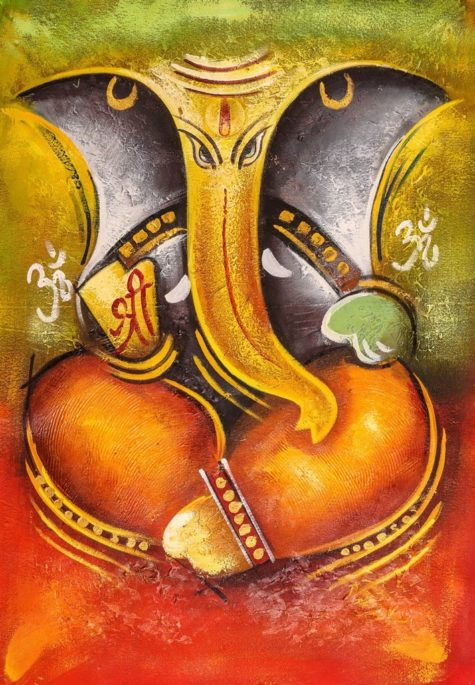
What is a Shloka?
Shloka is a Sanskrit word referring to a verse, proverb, hymn or poem that uses a specific meter. It is considered as the classic basis for epic Indian poetry as its use is widespread in traditional Sanskrit poems. Among the famous texts written entirely in shlokas are the “Ramayana” and “Mahabharata.”
Technically, a shloka can be made up of any sort of four-line stanza with up to 26 letters in a single line. In terms of yoga practice, it is likely that a yogi who meditates will come across this classical form of verse in the mantras that can help one meditate effectively.
Shlokas on Lord Ganesh:
Shuklaambara Dharam Vishnum
Shashi Varnam Chatur Bhujam
Prasanna Vadanam Dhyaayet
Sarva Vighna Upashaanthaye
Meaning: We meditate on Lord Ganesha – who is clad in white (representing purity), who is all pervading (present everywhere), whose complexion is gray like that of ash (glowing with spiritual splendor), who has four arms, who has bright countenance (depicting inner calm and happiness) and who can destroy all obstacles (in our spiritual and worldly path).
Vakratunda Mahakaaya
Suryakoti Samaprabha
Nirvighnam Kuru Mey Deva
Sarva Kaaryeshu Sarvada
Meaning: The Lord with the curved trunk and a mighty body, who has the luster of a million suns, I pray to thee Oh Lord, to remove the obstacles from all the actions I intend to perform.

Agajaanana Padmaarkam
Gajaananam Aharnisham
Anekadantham Bhaktaanaam
Ekadantam Upaasmahey
Meaning: I worship day and night that elephant faced Lord Ganesha who is like sun to the lotus face of Mother Parvati. Giver of many boons, the single tusked Ganesha, I salute Thee to give me a boon.

Gajaananam Bhoota Ganaadhi Sevitam
Kapitta Jamboophaala Saara Bhakshitam
Umaasutam Shoka Vinaasha Kaaranam
Namaami Vighneswara Paada Pankajam
Meaning: The Lord with the elephant face, served by all the Ganas, One who takes as His food, the essence of Kapitta and Jamboophala (these are two favorite fruits of Ganesha), son of Uma (Mother Parvati), destroyer of misery of the devotees, controller of obstacles, we worship Your Lotus Feet.

Ganaanaam Twam Ganapathi Gam Havaamahe
Kavim Kaveenaam Upamasra Vastamam
Jyeshta Raajam Brahmanaam Brahmanaspatha
Aanashrunvanna Oothibhi Seedha Saadanam
Meaning: We invite You, the Lord of spiritual faith (of Lord Shiva). You are the wisest among the wise, the best to be given as a standard of comparison. You are the senior Lord, Lord of the Vedic mantras, listening to our prayers. Please visit our home with prosperous things and be seated here.
Tatpurushaaya Vidmahe
Vakratundaaya Dheemahe
Tanno Danthihi Prachodayaat
Meaning: We meditate on that super power, we invoke the single tusked boon giver, Ganesha.

GANESHA PANCHARATNAM
Mudakaraatha Modakam Sada Vimukti Saadhakam
Kalaadharaavatamsakam Vilasiloka Rakshakam
Anaaya Kaika Naayakam Vinasitebha Daityakam
Nataasubhasu Naashakam Namaami Tham Vinaayakam.
Meaning: I prostrate before Lord Vinaayaka who joyously holds modaka in His hand, who bestows salvation, who wears the moon as a crown in His head, who is the sole leader of those who lose themselves in the world. The leader of the leaderless who destroyed the elephant demon called Gajaasura and who quickly destroys the sins of those who bow down to Him, I worship such a Lord Ganesha.

Natetaraati Bheekaram Navoditaarka Bhaasvaram
Namat Suraari Nirjanam Nataadhi Kaapa Duddharam
Suresvaram Nidheesvaram Gajesvaram Ganeshvaram
Mahesvaram Samaasraye Paraatparam Nirantaram.
Meaning: I meditate eternally on Him, the Lord of the Ganas, who is frightening to those not devoted, who shines like the morning sun, to whom all the Gods and demons bow, who removes the great distress of His devotees and who is the best among the best.

Samasta Loka Samkaram Nirasta Daitya Kunjaram
Daredarodaram Varam Vare Bhavaktra Maksharam
Krupaakaram Kshamaakaram Mudaakaram Yasaskaram
Manaskaram Namaskrutaam Namaskaromi Bhaasvaram.
Meaning: I bow down with my whole mind to the shining Ganapati who brings happiness to all the worlds, who destroyed the demon Gajasura, who has a big belly, beautiful elephant face, who is immortal, who gives mercy, forgiveness and happiness to those who bow to Him and who bestows fame and a well disposed mind.

Akimchanaarti Marjanam Chirantanokti Bhaajanam
Puraari Poorva Nandanam Suraari Garva Charvanam
Prapancha Naasha Bheeshanam Dhananjayaadi Bhushanam
Kapola Daana Vaaranam Bhajaey Puraana Vaaranam.
Meaning: I worship the ancient elephant God who destroys the pains of the poor, who is the abode of Aum, who is the first son of Lord Shiva (Shiva who is the destroyer of triple cities), who destroys the pride of the enemies of the Gods, who is frightening to look at during the time of world’s destruction, who is fierce like an elephant in rut and who wears Dhananjaya and other serpents as his ornaments.

Nitaantikaanta Dantakaanti Mantakaanta Kaatmajam
Achintya Rupa Mantaheena Mantaraaya Krintanam
Hrudantarey Nirantaram Vasantameva Yoginam
Tameka Danta Meva Tam Vichintayaami Santatam.
Meaning: I constantly reflect upon that single tusked God only, whose lustrous tusk is very beautiful, who is the son of Lord Shiva, (Shiva, the God of destruction), whose form is immortal and unknowable, who tears asunder all obstacles, and who dwells forever in the hearts of the Yogis.

Mahaaganesa Pancharatnam Aadarena Yonvaham
Prajapati Prabhaatake Hrudi Smaran Ganesvaram
Arogatham Adoshataam Susaahitim Suputrataam
Samaahitaayu Rastabhootim Abhyupaiti Sochiraat.
Meaning: He who recites this every morning with devotion, these five gems about Lord Ganapati and who remembers in his heart the great Ganesha, will soon be endowed with a healthy life free of all blemishes, will attain learning, noble sons, a long life that is calm and pleasant and will be endowed with spiritual and material prosperity.
From: Saidarshan.org
About The Swastika Symbol
The swastika has been regarded as the symbol for good luck, protection and auspiciousness for over five thousand years in India. It is derived from ‘SU-VASTI’ and means “The essence of all goodness”. For Hindus the swastika is a lucky cross associated with the good fortunes given by Lord Ganesha. It also represents the sun and the cycle of life.
This ancient benign symbol is used today by housewives to guard thresholds and doors, by priests to sanctify ceremonies and offerings and by businessmen to bless the opening pages of account books each New Year’s day. No ceremony or sacrifice is considered complete without it, for it is believed to have the power to ward off misfortune and negative forces.
It is said that the swastika’s right-angled arms reflect the fact that the path toward our objectives is often not straight, but takes unexpected turns. They denote also the indirect way in which Divinity is reached — through intuition and not by intellect. Symbolically, the swastika’s cross is said to represent God and creation.
The four bent arms stand for the four human aims:
- Righteousness – dharma
- Wealth – artha
- Love – kama
- Liberation – moksha.
It also represents the world wheel, eternally turning around a fixed center, God. The swastika is associated with the muladhara chakra, the center of consciousness at the base of the spine, and in some yoga schools with the manipura chakra at the navel, the center of the microcosmic sun (surya).
The swastika is a sacred sign of prosperity and auspiciousness, perhaps the single most common emblem in earth cultures. As the Encyclopaedia Britannica explains, “It was a favorite symbol on ancient Mesopotamian coinage; it appeared in early Christian and Byzantine art (where it became known as the gammadion cross because its arms resemble the Greek letter gamma); and it occurred in South and Central America (among the Mayans) and in North America (principally among the Navajos). In India it continues to be the most widely used auspicious symbol of Hindus, Jainas and Buddhists.”
When Buddhism emerged from India’s spiritual wellspring, it inherited the right-angled emblem. Carried by monks, the good-luck design journeyed north over the Himalayas into China, often carved in statues into Buddha’s feet and splayed into a spectrum of decorative meandering or interconnecting swastikas.
On the other side of the planet, American Indians inscribed the spoked sign of good luck into salmon-colored seashells, healing sticks, pottery, woven garments and blankets. Two thousand miles south, the Mayans of the Yucatan chiseled it into temple diagrams.
Once moored to the ancient highland cultures of Asia Minor, the emblem later voyaged around the Mediterranean, through Egypt and Greece, south into the African nations, northward into Saxon lands and Scandinavia and west to Scotland and Ireland.
In the 1930s, when Adolf Hitler’s Nazi Third Reich rose to power in Germany and engulfed the planet in World War II, the fortunes of the swastika declined. From September 1935 to the fall of the Nazis in 1945 it was displayed on the Reich’s official flag, a black swastika in a white circle against a red field. German soldiers also wore the hackenkrenz (“hooked cross”) on their uniforms, in a circle beneath an eagle, and displayed it on their armory. In the West it became an infamous, hated symbol of fascism and anti-Semitism and was banned by the Allied Command at the war’s end, though the swastika’s history is as extensive in the West as in Asia.
Because of its infamous association with the Third Reich, the swastika was and still is abhorred by many inside and outside of Germany, still held in disparagement and misunderstanding, which itself is understandable though unfortunate. Now is a time for this to change, for a return to this solar symbol’s pure and happy beginnings. Ironically, even now Hindus managing temples in Germany innocently display on walls and entryways the swastika, the ancient symbol of Lord Ganesha and more recently the hated insigne of Nazism, alongside the shatkona, six-pointed star, the ancient symbol representing God Siva and Lord Karttikeya and as Star of David, the not so ancient but cherished already for centuries emblem of Judaism.
The swastika is an emblem of geometric perfection. In the mind’s eye it can be stable and still or whirl in perpetual motion, its arms rotating one after another like a cosmic pinwheel. It is unknown why and how the term swastika, “may it be good,” was wedded to this most ancient and pervasive of symbols. Most authorities designate the right-hand swastika as a solar emblem, capturing the sun’s path from east to west, a clockwise motion. One theory says it represents the outward dispersion of the universe.
One of its finest meanings is that transcendent reality is not attained directly through the logic of the mind, but indirectly and mysteriously through the intuitive, cosmic mind. Though Hindus use the swastika straight up and down, other cultures rotated it at various angles.
From a mystically occult point of view the swastika is a type of yantra, a psychic diagram representing the four-petalled muladhara chakra located at the base of the spine within everyone.
Borrowed from: Sigils Symbols and Signs
- Radical Self Care Project Overview by shirleytwofeathers - No Comment
- Radical Self Care Image Gallery by shirleytwofeathers - No Comment
- It’s A Wrap by shirleytwofeathers - 3 Comments
- Something To Consider by shirleytwofeathers - 1 Comment
- Nurturing Your Precious Self by shirleytwofeathers - 3 Comments
me: Make Your Own Violet Fire
Abdulrahman: Money Chant – Very Fast
Shirley Twofeathers: It’s A Wrap
Daniel Knirs: It’s A Wrap
Shirley Twofeathers: It’s A Wrap

